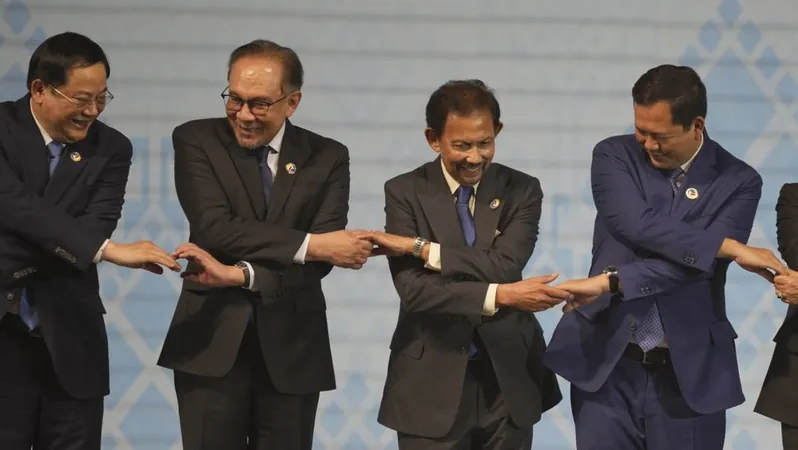
Malaysia’s Upcoming ASEAN Chairmanship: Challenges and Opportunities Ahead
2024-10-09
Author: Arjun
Malaysia’s Upcoming ASEAN Chairmanship: Challenges and Opportunities Ahead
As Malaysia gears up to assume the chairmanship of the Association of Southeast Asian Nations (ASEAN) in 2025, its recent foreign policy pivot towards nations like China and Russia has raised both anticipation and concern among its fellow member states. The handover of the chair from Laos is set to take place at the conclusion of the ASEAN Summit in Vientiane, with Malaysian Prime Minister Anwar Ibrahim taking the lead in steering the regional bloc.
While the chairmanship rotates annually among ASEAN’s ten member states, analysts suggest that Malaysia’s approach might not drastically change the existing framework of the organization. Although the chair can play a significant role in influencing discussions, the collective decision-making model means that unilateral decisions are unlikely.
A Balancing Act: Driving ASEAN’s Global Relations
Malaysia's refreshed foreign policy includes a commitment to fostering closer ties with BRICS nations (Brazil, Russia, India, China, and South Africa) while maintaining ASEAN's traditional neutrality. This dual approach aims to ensure balanced relations with major global powers. Observers note that Prime Minister Anwar's recent invitation to Russian President Vladimir Putin to the next ASEAN Summit could provoke mixed reactions among Malaysia’s ASEAN partners.
Dr. Azmi Hassan of the Nusantara Academy highlights that Malaysia's chairmanship will be a test of its diplomatic finesse as it aims to strengthen ASEAN's connectivity with both Western nations and emerging economies. Anwar emphasized the importance of South-South cooperation in recent remarks, indicating a desire to expand partnerships beyond the regional bloc.
Navigating Tensions in the South China Sea
A significant challenge for Malaysia will be managing ASEAN's complex relationship with China, particularly amid escalating territorial disputes in the South China Sea. With ongoing claims from multiple ASEAN nations, balancing relations with China while advocating for members’ sovereign rights will be crucial. Malaysia, celebrating its 50th diplomatic relationship with China, may face scrutiny for perceived favoritism or bias.
Experts, including Joshua Kurlantzick at the Council on Foreign Relations, suggest that Malaysia's ability to mediate effectively between ASEAN members and China will be tested during potential disputes over natural resource development in the contentious South China Sea.
A Stricter Stance on Myanmar’s Human Rights Crisis
Malaysia is poised to take a more assertive stance on the ongoing humanitarian crisis in Myanmar under its leadership. The current chair, Laos, has been criticized for its restrained response, whereas Malaysia is expected to advocate for stronger actions that align with its history of vocal human rights advocacy.
The urgency of the situation stems from the military junta’s disregard for a previously agreed-upon “five-point consensus” for restoring peace. Anwar has committed to pushing for more robust measures aimed at addressing this crisis, potentially advocating for a rethink of ASEAN's decision-making processes regarding Myanmar.
Maintaining ASEAN’s Relevance Amidst Global Challenges
As geopolitical tensions rise and divisions proliferate, maintaining ASEAN's centrality and coherence is paramount according to Anwar. He has urged member states to emphasize unity and reject influences that might lead to discord. The effectiveness with which Malaysia can uphold ASEAN’s relevance while addressing pressing regional issues will remain a focal point of interest.
While some analysts predict minimal advancement on pressing concerns like the Myanmar crisis or tensions in the South China Sea due to the dichotomy of interests among member states, the upcoming chairmanship offers Malaysia a critical platform to redefine regional diplomacy.
Conclusion: A Turning Point for Malaysia and ASEAN
As Malaysia prepares for its chairmanship, the spotlight will be on how effectively it navigates its relationships with China, Russia, and other global powers while addressing internal challenges within ASEAN. The next few years could very well determine Malaysia’s role in shaping the future dynamics of Southeast Asian diplomacy and the unity of the bloc amid an increasingly complex international landscape. Will Malaysia rise to the occasion as a cohesive force in ASEAN, or will its ambitions lead to fractures in regional unity? Only time will tell.




 Brasil (PT)
Brasil (PT)
 Canada (EN)
Canada (EN)
 Chile (ES)
Chile (ES)
 España (ES)
España (ES)
 France (FR)
France (FR)
 Hong Kong (EN)
Hong Kong (EN)
 Italia (IT)
Italia (IT)
 日本 (JA)
日本 (JA)
 Magyarország (HU)
Magyarország (HU)
 Norge (NO)
Norge (NO)
 Polska (PL)
Polska (PL)
 Schweiz (DE)
Schweiz (DE)
 Singapore (EN)
Singapore (EN)
 Sverige (SV)
Sverige (SV)
 Suomi (FI)
Suomi (FI)
 Türkiye (TR)
Türkiye (TR)